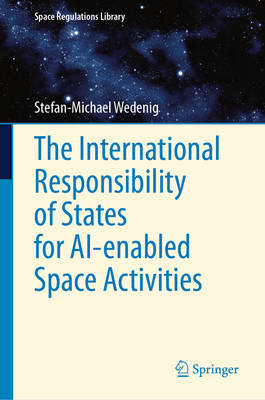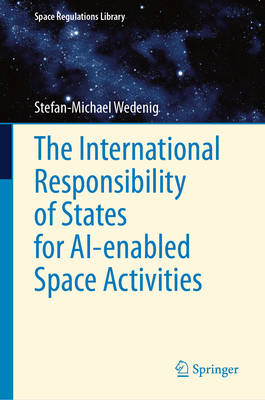
- Retrait en 2 heures
- Assortiment impressionnant
- Paiement sécurisé
- Toujours un magasin près de chez vous
- Retrait gratuit dans votre magasin Club
- 7.000.0000 titres dans notre catalogue
- Payer en toute sécurité
- Toujours un magasin près de chez vous
The International Responsibility of States for Ai-Enabled Space Activities
Stefan-Michael Wedenig
274,95 €
+ 549 points
Description
Artificial Intelligence (AI) has permeated our every-day lives. What once was solely a human task, has now been taken over by AI. May it be credit card approvals, customer support, financial transactions, medical imaging or software development, there is AI working behind the scenes. Outer space, historically always amongst the most developed domains, has not remained untouched for long and space applications have started to increasingly rely on AI. However, this increase in use also leads to a myriad of legal issues, particularly the issue of responsibility and liability under Article VI and Article VII of the Outer Space Treaty and the Liability Convention. Our legal norms, may they be domestic or international in nature, are ultimately built around human behaviour and when applied to AI might not function. Should damage caused by an AI-enabled space object arise, it proves difficult to assess the responsibility of the appropriate State party under Article VI of the Outer Space Treaty, or the liability of the launching State. While legal literature is primarily concerned with domestic legal issues arising from the use of AI, an in-depth analysis concerning State responsibility and liability for AI-enabled space activities is absent. Space legal literature strongly favours a view advocating for the creation of new "hard law" in form of new binding legal instruments, or the amendment of existing law. Suggestions de lege ferenda are often relied on by authors. Given the inherent difficulty in creating new law, or amend existing legal instruments, this book proposes to look towards the lex lata and argues that the existing legal norms of State responsibility, State liability and treaty law are sufficient to govern the responsibility of States for their AI-enabled apace activities. The present research looks at these issues from a public international law perspective and proposes a solution within the lex lata.
Spécifications
Parties prenantes
- Auteur(s) :
- Editeur:
Contenu
- Nombre de pages :
- 220
- Langue:
- Anglais
- Collection :
- Tome:
- n° 13
Caractéristiques
- EAN:
- 9783032095053
- Date de parution :
- 21-11-25
- Format:
- Livre relié
- Format numérique:
- Genaaid
- Dimensions :
- 155 mm x 235 mm
- Poids :
- 461 g

Seulement chez Librairie Club
+ 549 points sur votre carte client de Librairie Club
Les avis
Nous publions uniquement les avis qui respectent les conditions requises. Consultez nos conditions pour les avis.





